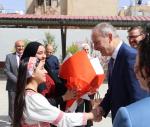You are here
Air strikes not enough
Sep 30,2014 - Last updated at Sep 30,2014
It has been more than a week since five Arab countries joined the US-led coalition in bombing Islamic State targets in both Syria and Iraq.
The event is unprecedented and bolsters Washington’s case that the onslaught is not directed towards the region’s Sunnis, but aims at degrading and destroying an extremist terrorist organisation with no links to true Islam, which has become a threat to the region and the world.
But in spite of persistent air strikes, whose immediate objective is to undercut IS funding channels, such as oil refineries, and to check the advance of militants in Iraq and Syria, there are few indications that the air campaign alone will be enough to defeat IS in the short run.
The international coalition now comprises more than 50 countries, with Britain, Belgium, The Netherlands and Denmark dispatching fighter jets to the region to participate in aerial bombardment and reconnaissance flights in Iraq.
The US and its Arab allies (Saudi Arabia, Jordan, Qatar, Bahrain and the United Arab Emirates) are bombing IS targets in Syria, a move that was criticised by Russia and Iran and dubbed as a breach of international law.
Now the discussion is shifting to the need to look into the deployment of ground forces at a future stage, something that the majority of coalition members object to, including the US and Britain.
The strategy is to support the Iraqi army and the Kurdish peshmerga in the field and to arm the so-called moderate opposition in Syria to fend off IS militants.
It is here that doubts are being raised about the efficacy of such approach.
On Monday, reports said that IS fighters were only few kilometres from the Iraqi capital Baghdad, a shocking development that once again underlined fundamental flaws in the Iraqi army.
US President Barack Obama admitted that his administration and intelligence officials had underestimated the threat posed by IS and overestimated the Iraqi army’s capacity to defeat the militant group.
Similarly, IS fighters’ advance on the strategic Kurdish dominated town of Ain Al Arab — on the Turkish-Syrian border — continued despite fierce resistance from Kurdish forces who are backed by allied jet fighters.
The militants overrun a number of Kurdish towns in the region, driving more than 200,000 residents to flee into Turkey.
The air strikes, which killed IS fighters as well as those belonging to Al Qaeda affiliate group Al Nusra Front, have pushed the two to forget their differences and join forces. Both threatened to carry out reprisals against coalition countries.
These developments have cast a shadow of doubt over the effectiveness of hitting IS and others from the air while relying on Iraqi and Syrian forces on the ground.
Turkey, which is yet to join the coalition, is said to be contemplating sending ground forces into Syria.
Turkish President Recep Tayyip Erdogan said his country needs to take a frontline role in the fight against IS militants in Syria. He warned that air strikes would not be enough to “finish off” the militants, hinting that ground forces could be mobilised.
He is seeking parliament backing and may request UN approval to establish a buffer zone along the borders with Syria.
Unconfirmed reports said Jordan agreed to send its elite special forces to carry out missions in Syria. But will this be enough to defeat the Islamist militants?
Meanwhile, there are a number of issues which directly affect the outcome of this long and costly campaign. One is the role that Sunni tribes in Iraq will play in the near future.
There are no indications that these tribes have actively turned against IS in western and northern Iraq.
With Shiite militias at the forefront of fighting IS in the north of the country, many Sunnis express fear of reprisals against them once the militants have been driven back.
It is the same in Al Anbar province, where Sunni tribes are yet to join efforts to fight IS militants in control of major towns there.
Many of them are still doubtful about the will of the new government in Baghdad to deal with their legitimate concerns.
Then there is the pressing matter of arming the Free Syrian Army (FSA) and the so called moderate rebels fighting the regime of President Bashar Assad.
The US offered to train and arm these fighters, but the Syrian opposition wants air strikes to target Assad forces as well.
This is a contentious issue within the US-led coalition and will be opposed by Russia and Iran.
It is important to note that many rebel groups fight under various Islamist banners and some of them have few ideological differences that separate them from IS and Al Nusra Front.
How will arming the FSA affect the fight against IS and what will happen when and if the militants are defeated?
The fate of the Damascus regime remains an open-ended question.
The biggest challenge for the US-led coalition, in the medium and long terms, will be to safeguard it against conflicting agendas by member countries.
The IS defeat will bring back pressing questions about the role of Iran in Iraq, the future of Kurdistan and the fate of Assad, among others.
The writer is a journalist and political commentator based in Amman.













